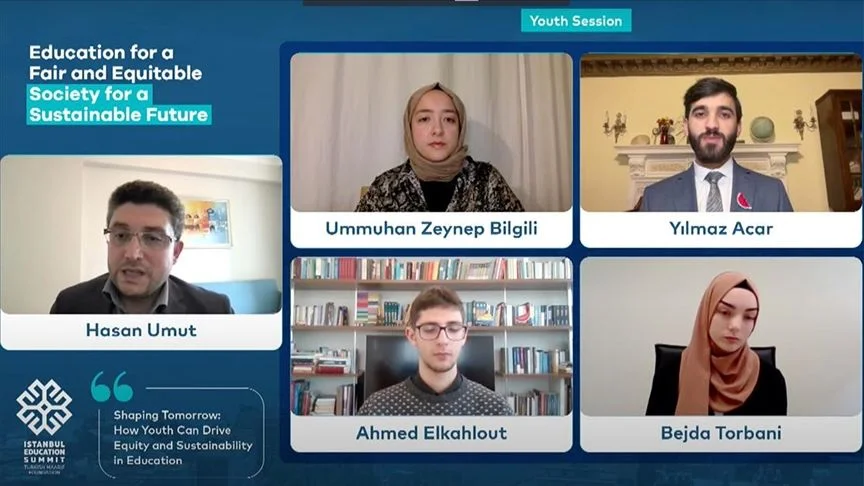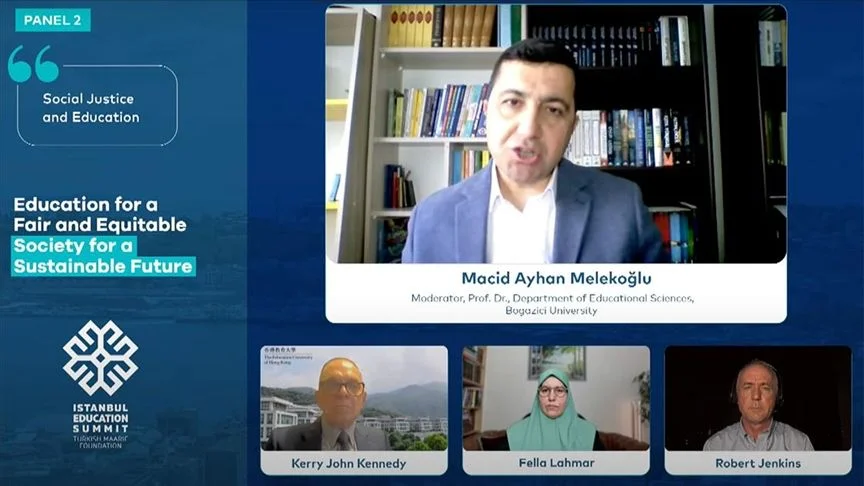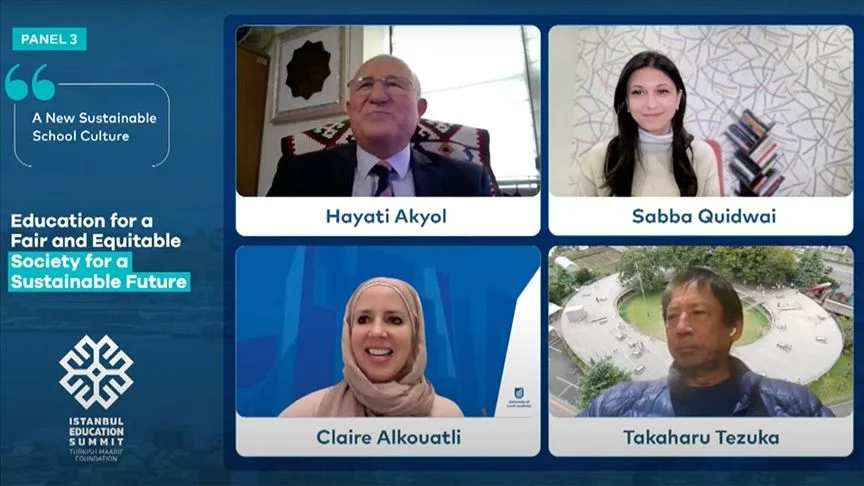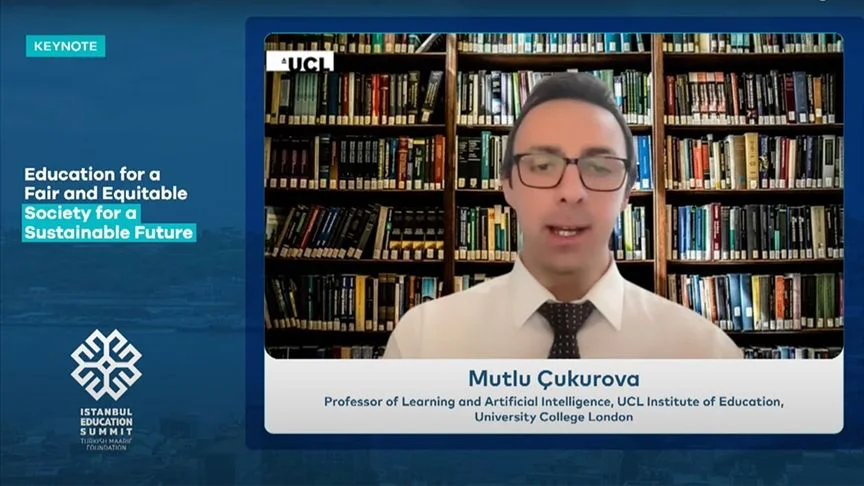
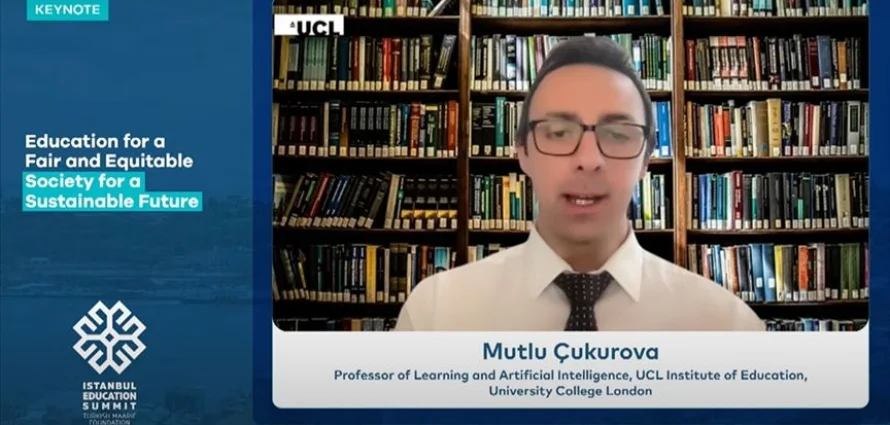
December 09, 2024
The 2nd day of the summit, organized online by Turkish Maarif Foundation with the theme of "Education for a Fair and Equitable Society for a Sustainable Future", started with a panel titled "Social Justice and Education".
The panel, moderated by Boğaziçi University Faculty of Education Faculty Member Prof. Dr. Macid Ayhan Melikoğlu, was attended by guests who are experts in their fields.
Prof. Dr. Kerry John Kennedy, Head of the Department of Curriculum and Instruction and Academic Development Advisor at the Hong Kong University of Education, discussed the educational structure in Asia in terms of diversity, inclusion and equity in her speech at the panel.
Stating that the issue of equality is handled differently in the university admission process in many countries in Asia, Kennedy emphasized that factors such as race, ethnicity, language, culture, gender and physical ability affect access to education.
Kennedy said inclusivity is not seen as a very strong value in the Asian context, it needs to be transcended.
Ethical responsibility in education
Dr. Fella Lahmar, who has the title of Senior Member of the Higher Education Academy (SFHEA) in the UK, also touched on the problems of equality, justice and ethics in education, stating that education creates identities, shapes cultures and builds futures.
Lahmar pointed out that QS, THE, and PISA, which is part of the Organization for Economic Co-operation and Development (OECD), which makes international rankings of countries and universities in education, often violate ethical outcomes.
Pointing to the place of Israel's Technion University in the world rankings against the destruction of the education system in the Gaza Strip, Lahmar said that the global education matrices look at these educational achievements from a Eurocentric perspective.
Lahmar noted that the Technion University is highly ranked in THE, and that its innovations have supported military operations in Gaza, been used in the loss of lives, colonization, and the destruction of heritage, culture and infrastructure.
Stating that educational institutions in the Gaza Strip are ignored in these rankings, Lahmar emphasized that schools and universities have been destroyed in Gaza and hundreds of thousands of students do not have access to education.
On the other hand, Dr. Lahmar said that the Technion University, which has directly contributed to the destruction in Gaza, has won achievements and awards for its research.
Explaining that this situation shows the failure of the global education system, Lahmar said that the ratings of research institutions such as PISA, QS AND THE on education are made without taking ethical responsibility.
Lahmar pointed out the need for an ethical approach to education globally and said, "Human dignity needs to be protected, we need to get rid of the colonial legacy, and ethical problems need to be considered."
The importance of financial support for education in low-income countries
Harvard University Faculty Member Prof. Dr. Robert Jenkins also touched on the issue of education and social justice and questioned what is taught in education and how it is taught.
Stating that there are problems in accessing education at the global level, Jenkins said, "There has been an increase in the level of basic education in the last 50 years, but this has not led to equality of learning. In other words, we do not see a similar success at the learning level."
Drawing attention to the difference between the budget allocated to education per child in low- and high-income countries, Jenkins noted that it is important to provide financial support to low-income countries in order to close this gap.
- Young Session
At the 4th Istanbul Education Summit, a panel titled "Shaping Tomorrow: How Young People Can Ensure Equality and Sustainability in Education" was held.
The panel at the summit was moderated by Assoc. Prof. Dr. Hasan Umut from the Department of History at Boğaziçi University.
In her speech at the panel, Dr. Ümmühan Zeynep Bilgili from Harvard University Medical School said that there is always hope in terms of equality and justice in education.
Showing bird nests in his presentation in which he made use of visuals, Bilgili said, "Birds build nests using everything they can find. As you can see in the photo, sometimes they also use plastics. Even though the system has problems, we need to produce good things by using the resources we have."
Bilgili continued his words as follows:
"Equity in education is not just about providing the same materials; to be able to offer resources to the students there according to their needs. We can create systems that will solve problems after noticing students who are not thought about and noticed and seeing their needs. For example, if you have a cough problem, when you go to a doctor, our main goal should not be just to stop coughing. We have to think about what is its source and what is its cause. This is also the case in the classroom. Sometimes the problem isn't with the student; Perhaps the source of the problem lies in the presentations."
Mentioning that people are trying to build the future with the opportunities they have, Bilgili said, "That's why we need to provide them with the necessary tools. Young people are already changing systems. But we have to give them the tools they need."
"A value-based education model transforms not only students but also society"
Yılmaz Acar, who was born and raised in Mardin and graduated from the Department of Political Science at the University of Chicago, stated that education built on values will become an element that ensures sustainability and justice in society.
Drawing attention to the importance of the value and morality-based education model, Acar said, "Any education program must be based on an ethical basis. It should contribute to the character development of students and create benefits for society. When we consider the issue of sustainability, it is not limited to the economy and the environment. It also includes issues of intergenerational equality and justice. While education systems contribute to the development of contemporary generations, they should also create a sense of responsibility for future generations."
Acar continued his speech as follows:
"Education is not limited to the classroom environment, it is an ongoing process within the community. Therefore, as I have seen in my experience, education is a successful education if it makes the individual a better person and benefits society. During the earthquakes in February 2023, my classmates and I went to the area to give support to local communities. We shared our meals with the people there, we stayed together under the same roof in freezing temperatures. This experience made me understand once again the meaning and value of education. Education is only meaningful when it creates positive change. A value-based education model transforms not only students, but also society."
"Education is a priority and should be provided equally for all as a fundamental right"
Bejda Torbani, a student at Samsun University Department of Biomedical Engineering, stated that young people play a critical role in the solution point in education and said, "Young people need to be ready for responsibility in order to make this contribution. It is imperative that they develop critical thinking skills, distinguish between good and bad, and be successful in expressing their own opinions. Because only in this way can we create a better education system."
Referring to the importance of empathy rather than personal gains, Torbani said, "I remember, one day when I was helping my friends, my teacher saw me and gave me a medal. It was a reward for showing kindness, not for being successful. Education isn't always about winning; it's about how we treat other people. Just as important as empathy is self-confidence. If we don't love ourselves, if we don't embrace our own identity and roots, how can we love others?"
Drawing attention to Palestinian children who do not have access to education, Torbani said:
"Think of the Palestinian children; Instead of enjoying learning in the classroom, they live in fear. However, we stand here as representatives of the dreams of young people. We are here to show that education is a right, not a privilege. Education is a priority and should be provided equally for all as a fundamental right. Education is not something that is only taught in the classroom. It transcends borders, unites cultures, and prepares individuals for the future. By working together, we can make education more equitable and accessible."
"Eliminating barriers is the basis of an equal education system"
Ahmed Elkahlout, a 16-year-old student of Kartal Anatolian Imam Hatip High School of Palestinian origin, who was the latest participant of the summit, said, "In front of the eyes of the world, people living in places like Gaza are constantly prevented from leading a normal life. As young people, we know very well what it means to lose our future. Unfortunately, this situation is not limited to Gaza; As a global problem, it affects the fate of all of us."
Stating that everyone should have access to information in order to reduce inequality in education, Elkahlout concluded his words as follows:
"Eliminating barriers such as the climate crisis, injustice and systemic discrimination is the foundation of an equal education system. A system in which every individual has equal rights in education both contributes to the development of students and supports social development. Education must adapt to the future, not just by habits from the past, but by addressing current issues such as technological developments and climate change. Otherwise, inequalities in education will deepen rather than decrease."
- III. Panel
At the 4th Istanbul Education Summit, which was held online, a panel titled "New and Sustainable School Culture" was held.
The moderator of the panel at the summit was Prof. Dr. Hayati Akyol from Gazi University Faculty of Education.
In her presentation at the panel, Dr. Claire Alkouatli from the University of South Australia sought answers to questions such as "Who is a person, what goals should they have, how can they work for the desired person?"
Emphasizing the importance of the role of the educator in society, Alkouatli said that diversity and inclusion would not be possible without the educator.
Stating that the educator is not just teachers, principals and vice-principals within the four walls of the school, Alkouatli pointed out the educational roles of the environment and the community.
Pointing out that with the industrial revolution in the West, the focus was on the cognitive side of education, Alkouatli said, "Love and closeness are at the center of all mental development. Children who have good communication with an adult grow up better. Every child needs an adult who is attached to them and a good friend."
Alkouatli stated that it is necessary to incorporate love into the educational environment.
New learning spaces that are interactive, barrier-free and wall-free
Prof. Dr. Takaharu Tezuka from Tokyo City University emphasized that the school is an area where information needs to be given, so it is important to bring it into a format that can share information.
Takaharu said that they have built schools of various designs in many countries of the world within the scope of new education concepts, and that they focus on new learning areas without barriers and walls.
Takaharu stated that they created an interactive environment for all school students as there was no wall between the classrooms, and noted that the children moved as they wished and he was happy about it.
Author, educator and entrepreneur Dr. Sabba Quidwai also underlined the importance of using artificial intelligence in the service of a sustainably oriented society.
Explaining that it is necessary to go beyond the borders in the education process, Quidwai stated that people can get out of their own borders by empathizing with others.
Quidwai emphasized the need to change methods in the education process and the importance of using artificial intelligence in schools.
"Artificial intelligence and learning"
On the second day of the summit, the topic of "artificial intelligence and learning" was discussed. The keynote speaker of the event, Prof. Dr. Mutlu Çukurova, who works in the field of learning and artificial intelligence at University College London, said that there have been great developments thanks to the creative technology GPTs.
Pointing out that artificial intelligence models are very successful in content production, Çukurova said, "Artificial intelligence communicates with people using natural language processing systems, hundreds of voices and pictures."
Prof. Dr. Çukurova stated that students' learning about artificial intelligence is seen as a strategic investment and said, "The use of artificial intelligence in education increases manpower. Artificial intelligence can be seen as a force that will eliminate discrimination in the education system. Everyone, especially policy makers, educators, and scientists, can use artificial intelligence to achieve this vision."
"Moral and traditional values should be strengthened"
Çukurova pointed out that artificial intelligence has started to outsource tasks that were once done only by humans, and noted that while this development gives happiness on the one hand, it brings some questions on the other.
Pointing out that it is necessary to protect the main points of humanity in the face of artificial intelligence, Prof. Dr. Çukurova said, "We need to further strengthen our empathy capacity and moral and traditional values at the point of using artificial intelligence."
Emphasizing that artificial intelligence does not think like humans, Prof. Dr. Çukurova said:
"AI doesn't process emotions or make a moral assessment. Artificial intelligence does not become a smarter person. Artificial intelligence is a designed consciousness. Being able to examine data is also related to making a perception within certain parameters. In addition, we have to say that artificial intelligence does not have any knowledge about which problem it solves, and it does not have a great perception of ethical and moral values."
"Humans can do so many things that AI can't"
Noting that human intelligence is an emotional intelligence, Prof. Dr. Çukurova said, "People can do many things that artificial intelligence still cannot do at the moment. Artificial intelligence, on the other hand, is much better than humans in some subjects. However, we cannot say that artificial intelligence is smarter than humans. The biggest difference between human consciousness and artificial intelligence is that artificial intelligence makes educational processes more comfortable and easy. Artificial intelligence can create a contextual system and enhance human development from an educational point of view. Artificial intelligence can help people change their mindset and increase human perception."
- Closing ceremony and awards
At the 4th Istanbul Education Summit, problems in the field of education were discussed and the critical role of education for a sustainable future was emphasized. In her closing speech, Assoc. Prof. Dr. Zeynep Arkan, Member of the Board of Trustees of Turkish Maarif Foundation and Chair of the Organizing Committee of the Istanbul Education Summit, stated that they aim to be a catalyst for education to create more inclusive and fair communities.
Arkan said that during the two-day summit, problems in the field of education were discussed and it was emphasized that education plays a critical role for a sustainable future.
Pointing out that the discussions at the summit focused on the transformative power of education, Arkan said, "We want the transformative power of education to act as a catalyst for the creation of more inclusive, resilient and strong communities. In this way, we continue to paint a picture of a more balanced and fairer education process. We continue on our way to solve problems together by providing an education based on a better dialogue and mutual exchange of ideas."
Stating that they will prepare for next year's summit with newer educational approaches with the ties established at the summit and the energy that emerged, Arkan said, "We are trying to create a brighter and fairer future together. We want to move towards our goals with a renewed energy."
At the closing of the summit, the "Good Example Awards", which are given with the aim of highlighting and supporting exemplary and innovative practices carried out by teachers and students in Turkish Maarif Foundation schools, were presented to their owners.
With the participation of students and teachers from International Maarif Schools, this year's 5th edition was held with the theme of "My Country", with the participation of 612 works from 32 countries. The works that were deemed worthy of awards in the International Maarif Photography Contest were announced.
